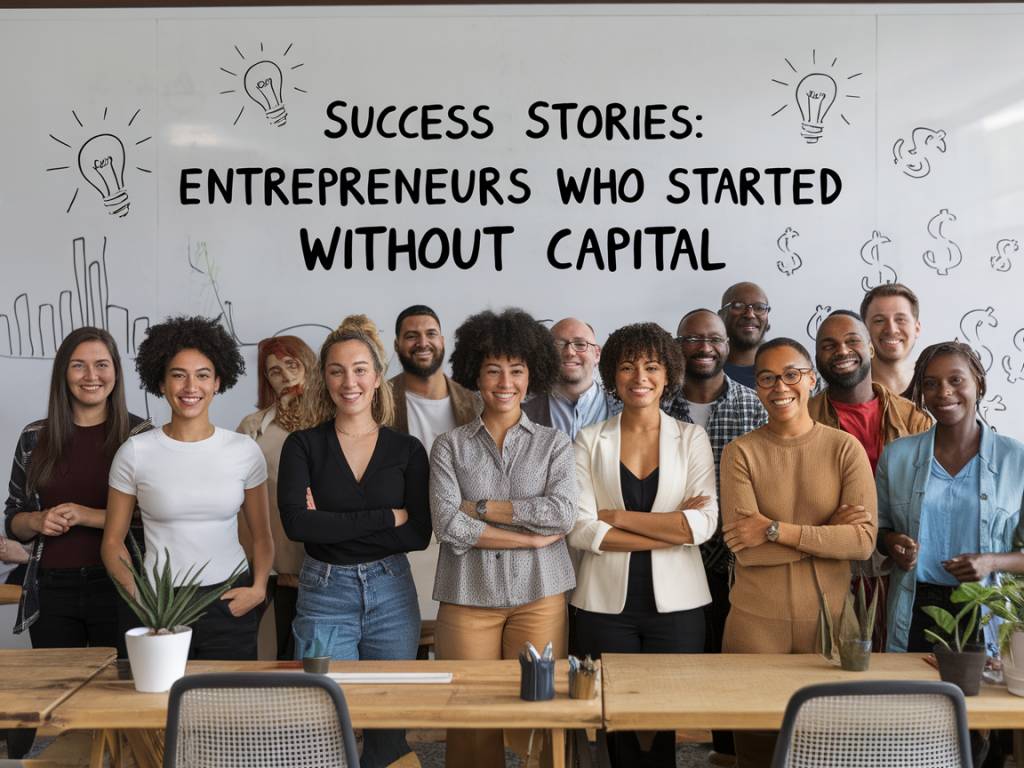When you think of successful entrepreneurs, high-profile names like Elon Musk or Jeff Bezos often come to mind, with their substantial financial resources and investments. However, many successful entrepreneurs started their journeys with minimal or no capital. This article delves into the stories of these remarkable individuals, offering insights, practical advice, and inspiration for aspiring entrepreneurs.
The Power of Starting Small: Sara Blakely, Spanx
Sara Blakely’s journey from a door-to-door fax machine salesperson to the billionaire founder of Spanx is nothing short of inspiring. She didn’t have investors or an enormous startup fund. Instead, she started with $5,000, which she had saved from her sales job.
Blakely identified a gap in the market: she wanted comfortable yet effective shapewear, and what she found in stores didn’t meet her needs. So, she set out to create it herself. Here are some key strategies that contributed to her success:
- Market Research: Blakely spent countless hours in stores, asking women about their preferences and testing different materials.
- Product Development: She used her own body as a testing ground, ensuring the product was perfect before launching.
- Bootstrapping: Instead of seeking investments, Blakely relied on her savings and reinvested early profits back into the business.
Through perseverance, direct sales tactics, and an unwavering belief in her product, Blakely grew Spanx into a company reportedly worth $1 billion.
Making Connections Work: Steve Jobs and Steve Wozniak, Apple
The story of Apple’s early days is well-known but worth revisiting, primarily because its founders started with minimal funds. Steve Jobs and Steve Wozniak initially worked out of a garage, using their technical skills and networking abilities to get by.
Jobs and Wozniak needed money to build their first computer. Here are some steps they took to overcome the financial hurdle:
- Bootstrapping: Jobs sold his Volkswagen microbus, and Wozniak sold his HP scientific calculator to raise $1,300 in seed money.
- Leveraging Skills: Both founders utilized their technical skills to build the prototype themselves, saving on development costs.
- Networking: They pitched their prototype to local electronic stores, securing their first major order which provided the needed cash flow.
With an initial modest investment, Apple quickly grew, today becoming one of the world’s most valuable companies. This story emphasizes the importance of leveraging skills and networks, especially when starting with minimal resources.
Community Support: Jan Koum, WhatsApp
Jan Koum, co-founder of WhatsApp, migrated to the United States from Ukraine with his mother, living on food stamps. His story exemplifies how community support and personal resilience can overcome financial limitations.
Here’s how Koum turned his vision into a multi-billion dollar company:
- Technical Skill: Koum deeply engaged in programming, gaining skills that allowed him to develop his app without financial investment.
- Community Resources: He used free resources, such as public libraries and open-source software, to aid in his education and app development.
- Investor Alignment: Through involvement in tech communities and previous employment at Yahoo, Koum met Brian Acton. Together they eventually attracted investor interest from Sequoia Capital, based primarily on the strength of their product and user growth rather than initial capital investment.
WhatsApp, launched with minimal funds, was eventually acquired by Facebook for $19 billion, proving that technical expertise and community support can compensate for a lack of initial financial resources.
Leveraging Personal Skills: Matt Maloney and Mike Evans, Grubhub
Matt Maloney and Mike Evans founded Grubhub, the online food delivery service, without the initial backing of massive capital. They had a clear vision and a set of skills that helped them build a valuable platform.
Their path to success involved several strategic decisions:
- Skill Utilization: Both Maloney and Evans had strong technical backgrounds, which allowed them to build the initial platform themselves, reducing early-stage development costs.
- Filling a Gap: They identified a lack of a comprehensive online platform for restaurant delivery services, tapping into this unmet need effectively.
- Bootstrap Marketing: They initially focused on small, high-impact marketing strategies, such as distributing flyers and effectively using word-of-mouth referrals.
- Iterative Improvement: Grubhub continually improved their platform based on user feedback, increasing its utility and user base.
By leveraging their technical expertise and solving a significant problem in a practical way, Maloney and Evans grew Grubhub, which later went public and continues to thrive in the competitive food delivery market.
Recommendations for Aspiring Entrepreneurs
From these inspiring stories, several actionable recommendations emerge for entrepreneurs starting with little to no capital:
- Leverage Personal Skills: Use your existing skills to develop your product or service. This reduces initial costs and increases control over the quality of your offering.
- Bootstrap: Reinvest any early earnings back into the business rather than seeking immediate profits. This can create a solid foundation for future growth.
- Network Effectively: Use your networks to gain advice, mentorship, and even initial customers. Strong relationships can often substitute for financial resources in the early stages.
- Validate the Market: Ensure there is a demand for your product or service before scaling operations, reducing the risk of wasted resources.
- Utilize Free Resources: Take advantage of free courses, libraries, and community programs to enhance your skills and knowledge base.
Starting with little or no capital is challenging but not impossible. By applying these strategies and learning from those who have succeeded before, aspiring entrepreneurs can set themselves on a path to success.

